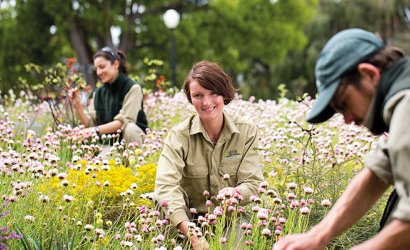

Why choose this course?
Embark on your career in horticulture with this qualification. This course will further enhance your knowledge of plant identification and displays, plant propagation, pruning, installing and maintaining turf, and weed, pest and disease management.
You will also learn to install irrigation, how to safely prepare, store and apply chemicals, operate machinery and how to work in and maintain a safe and healthy workplace.
When you complete this course, you will have the knowledge and ability to undertake a variety of horticultural tasks with confidence and to industry standard.
You can improve your career prospects, by enrolling into AHC40416 Certificate IV in Horticulture for a further 6 months.
This course is superseded. You can still enrol in this course, and you will be contacted if you need to transition into the next version when it is available.
Career opportunities
- Horticulturist
-
An IELTS score (academic) of 6.0 with no band score less than 5.0 or equivalent.
-
Completion of the equivalent of Australian Year 10.
Please refer to the Non-Tuition Fees section of your Letter of Offer for any additional requirements where a cost may be incurred.
There may be further semester intakes available for enrolment. You can view any further intakes when you submit your online application(opens in a new tab).
For information about pathways from TAFE to university, view our Pathways to university page.
How to apply
Apply to study at TAFE in six steps:
- find a course;
- check entry requirements;
- submit an application;
- accept your offer and pay;
- apply for your student visa; and
- receive your visa and come to Australia for your studies.
Build your own course guide
Select the study areas, courses and topics you like. Get your custom guide by email!
Download study area guide(opens in a new tab)
Contact us(opens in a new tab)
TAFE International Western Australia (TIWA) is the Registered Training Organisation (RTO) and Commonwealth Register of Institutions and Courses for Overseas Students (CRICOS) provider, for the delivery of training to international students, enrolled in a TAFE course in Western Australia. This nationally recognised course is delivered by a Western Australian TAFE college on TIWA's behalf. TIWA retains responsibility for the quality of the training and assessment delivered by the TAFE colleges and for the issue of certification documentation to students.


